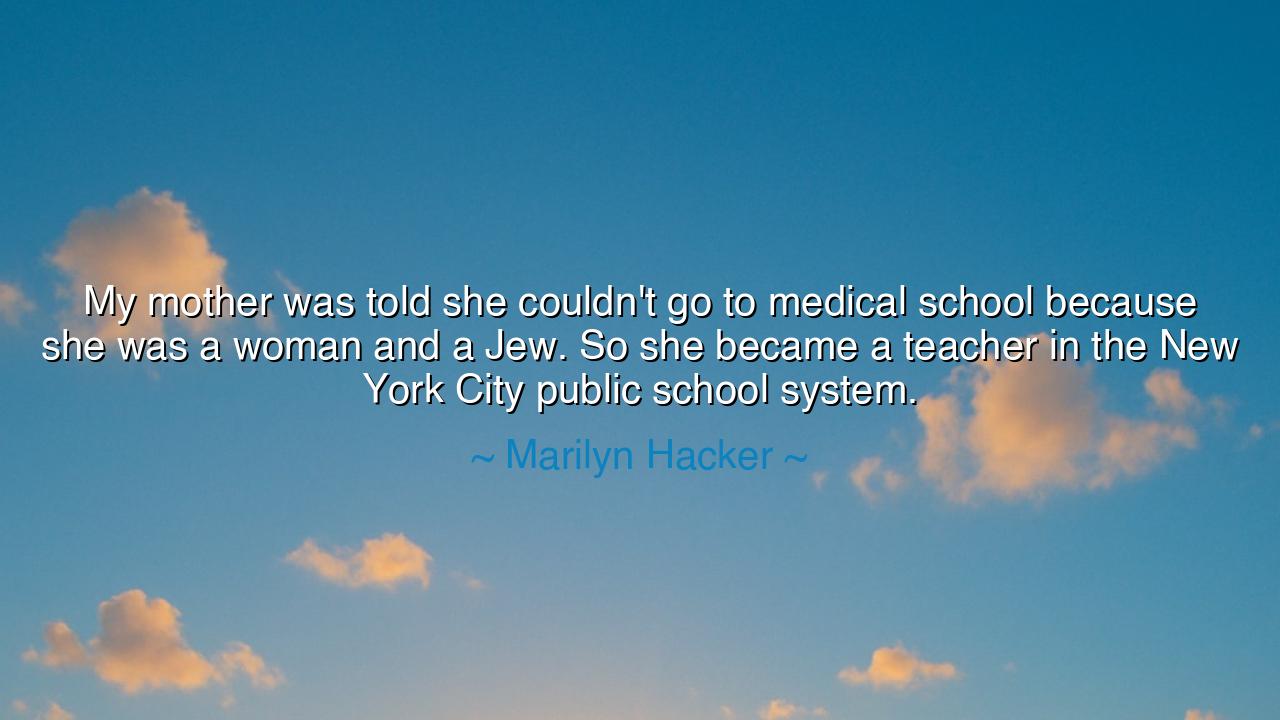
My mother was told she couldn't go to medical school because she
My mother was told she couldn't go to medical school because she was a woman and a Jew. So she became a teacher in the New York City public school system.






In the words of Marilyn Hacker there is both sorrow and strength: “My mother was told she couldn’t go to medical school because she was a woman and a Jew. So she became a teacher in the New York City public school system.” This is no idle anecdote but a testimony, one voice carrying the burden of prejudice and the triumph of resilience. It is a story as old as humanity: the denial of dreams by unjust powers, and the forging of new paths where old doors were barred.
The first truth in these words is the cruelty of exclusion. A brilliant young woman, ready to heal, to dedicate her life to the service of others, was told that her gender and her faith disqualified her. This was not a matter of skill, nor of merit, but of a society bound by blindness and fear. How many voices of healing were silenced by such prejudice? How many cures were delayed, discoveries lost, lives left unhealed because women and Jews, and countless others, were told, “This place is not for you”? Hacker’s words remind us of the cost of discrimination—not only to the individual, but to the whole of humanity.
And yet, out of denial, her mother chose a new path. She became a teacher, shaping young minds, planting seeds of knowledge, and carrying forward the flame of wisdom into the lives of children. Though barred from healing bodies, she turned to the healing of minds. Though denied one calling, she embraced another, equally noble. This is the power of resilience: to take the stone meant to block your way and use it instead as the foundation of another road.
History gives us many such examples. Marie Curie, though barred from higher education in her native Poland because she was a woman, sought learning underground and later changed the world with her discoveries of radiation. Rosa Parks, denied equality in her daily life, transformed her act of defiance into a spark that ignited a movement. In every age, those denied their rightful place have risen to create a new place—one that shames the systems that excluded them. Hacker’s mother stands in this same lineage of quiet heroism.
The deeper meaning of this story is that injustice is real, but so too is the human capacity to endure, adapt, and still give back. Prejudice may block one door, but it cannot extinguish the inner fire of purpose. Hacker’s mother could have surrendered to bitterness, yet she chose instead to lift others. In this we find the ancient truth: that dignity is not found in titles or positions, but in the steadfastness of the soul when tested.
The lesson for us is clear. We must not forget the pain of exclusion, nor must we allow it to continue in our own time. We must ask ourselves: whom are we still telling “no,” not for lack of ability, but for reasons of prejudice? And in our own struggles, when denied, we must remember that new paths exist—that the power to contribute, to uplift, to inspire cannot be destroyed by closed doors.
Therefore, let Hacker’s words be more than memory; let them be a guide. Honor those who came before you, who bore rejection yet still gave to the world. Resist the temptation to judge others by categories of birth. And when life denies you one dream, summon the courage to create another. For as her mother proved, even when barred from the halls of medicine, one can still become a healer—of minds, of spirits, and of generations yet unborn.






AAdministratorAdministrator
Welcome, honored guests. Please leave a comment, we will respond soon